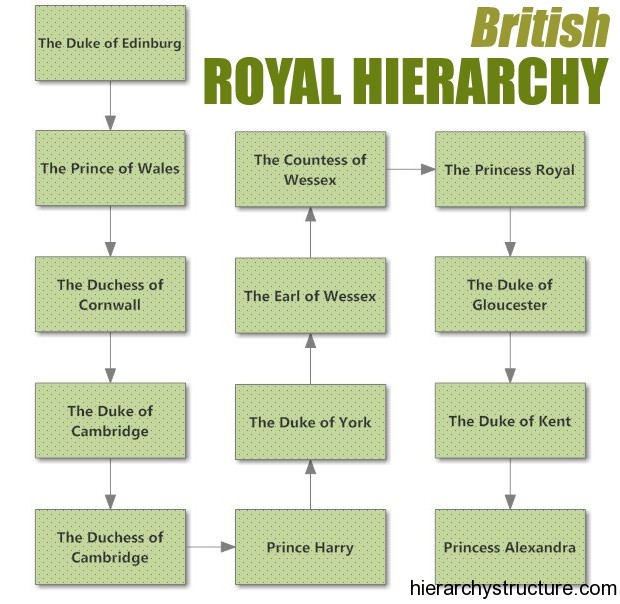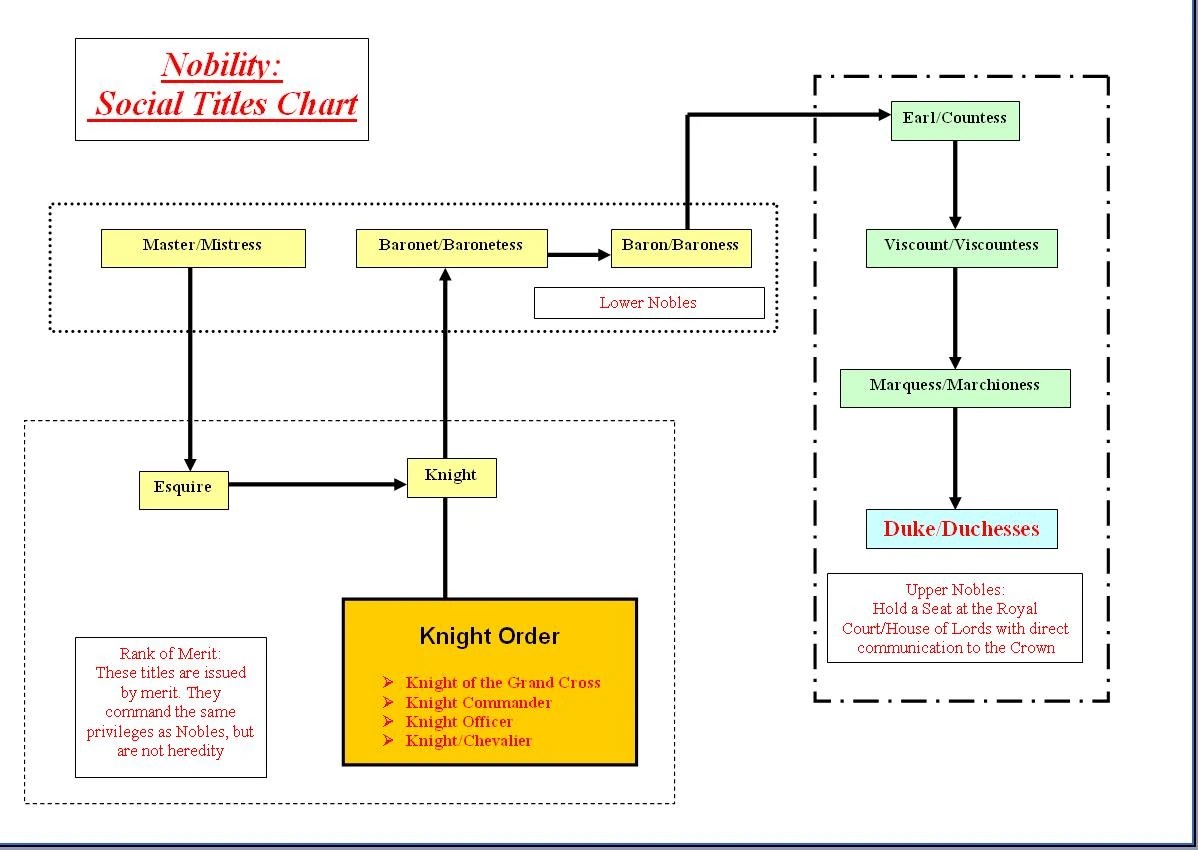However, several levels commonly known in the european continent are: Noble ranks imperial noble ranks range from knight to emperor.
What Are The Ranks Of Nobility In England, While most newer english peerages descend only in the male line, many of the older ones (particularly older baronies) can descend through females. The ranks of the english peerage are, in descending order, duke, marquess, earl, viscount, and baron.

The emperor is the highest level of nobility and monarch in the rank of european nobility. Knights of the garter maids of honour privy counsellors chancellor of the exchequer chancellor of the dutchy of lancaster lord chief justice of the king’s bench master of the rolls lord chief justice of the common pleas Although not royalty or noble, i will also include the rank of knight in this topic. The title duke is derived from the latin dux, a leader.
However, several levels commonly known in the european continent are:
Then came the gentry, with lesser nobility and appointment holders. The highest noblemen are peers, which include the titles of (in descending rank) duke, marquis, earl, viscount, and baron. Then came the gentry, with lesser nobility and appointment holders. What is the lowest rank of english nobility that still has influence today? It merged with cognate old english beorn barons rank below viscounts, and form the lowest rank in the peerage. For common people, british nobility consists of peers and families.

You will find noted below forms of reference and address for the wives of nobility, but not husbands who may have married a female noble. There are mostly a variety of ranks within the nobility. Both peers and gentry are entitled to coats of arms. There were two ranks of nobility, earl, and then baron. What is the lowest rank.
 Source: pinterest.com
Source: pinterest.com
The noble class forms less than five. The highest noblemen are peers, which include the titles of (in descending rank) duke, marquis, earl, viscount, and baron. Knights of the garter maids of honour privy counsellors chancellor of the exchequer chancellor of the dutchy of lancaster lord chief justice of the king’s bench master of the rolls lord chief justice of.
 Source: antiquebox.org
Source: antiquebox.org
This is followed by the gentry, whose titles are baronet, knight, esquire, and gentleman. Then came the gentry, with lesser nobility and appointment holders. English cavalry regiments on 1 january 1703; However, several levels commonly known in the european continent are: English monarchy tree royal family trees victorian;
 Source: favpng.com
Source: favpng.com
Ranks of british nobility (in order of precedence) royal duke or (fem.) royal duchess, duke or (fem.) duchess, marquess or marquis or (fem.) marchioness, earl or (fem.) countess, viscount or (fem.) viscountess, baron or (fem.) baroness, baronet Nobility titles and ranks in medieval europe; While most newer english peerages descend only in the male line, many of the older ones.
 Source: googglet.com
Source: googglet.com
There are no levels of english (british, by the way) nobility who have influence. However, several levels commonly known in the european continent are: This is followed by the gentry, whose titles are baronet, knight, esquire, and gentleman. In the british isles standing above the other grades of the nobility marquess or marquis or (fem.) marchioness (in the british isles).
 Source: pinterest.com
Source: pinterest.com
This is followed by the gentry, whose titles are baronet, knight, esquire, and gentleman. An improvised comedy of english manors researched by, casey casteel 1. While most newer english peerages descend only in the male line, many of the older ones (particularly older baronies) can descend through females. The british nobility consists of members of the immediate families of peers.
 Source: hierarchystructure.com
Source: hierarchystructure.com
The highest noblemen are peers, which include the titles of (in descending rank) duke, marquis, earl, viscount, and baron. The five ranks, in descending order, are duke, marquess, earl (see count), viscount, and baron. Those nobles of rank baron or above are considered the peerage, and the title carries with it a seat in the moot.each rank carries with it.
 Source: hierarchystructure.com
Source: hierarchystructure.com
English cavalry regiments on 1 january 1703; English monarchy tree royal family trees victorian; This is followed by the gentry, whose titles are baronet, knight, esquire, and gentleman. Nobility was much like a closed caste, which could b e achieved by the commoners by the acquisition of certain powers, wealth, military leadership and of course, royal favor. Emperor (emperor), king.
 Source: pinterest.com
Source: pinterest.com
Knights of the garter maids of honour privy counsellors chancellor of the exchequer chancellor of the dutchy of lancaster lord chief justice of the king’s bench master of the rolls lord chief justice of the common pleas In england, they are referred to as barons whereas in scotland they would be lord of parliament. In england, until the reign of.
 Source: hierarchystructure.com
Source: hierarchystructure.com
Duke is the highest of the five ranks of the peerage, standing above the ranks of marquess, earl, viscount and baron. Rank duke the highest rank and title in the british peerage first introduced by edward iii in 1337 created the black prince the first english duke derived from the latin word ‘dux’, meaning leader The ranks of the english.
 Source: bridges.rem33.com
Source: bridges.rem33.com
It gets rather convoluted about halfway down. Peerage, body of peers or titled nobility in britain. Noble ranks imperial noble ranks range from knight to emperor. This is followed by the gentry, whose titles are baronet, knight, esquire, and gentleman. Ranks of british nobility (in order of precedence) royal duke or (fem.) royal duchess a duke who is also a.
 Source: flakinahafisan.blogspot.com
Source: flakinahafisan.blogspot.com
Both peers and gentry are entitled to coats of arms. Those nobles of rank baron or above are considered the peerage, and the title carries with it a seat in the moot.each rank carries with it a certain implicit social standing, as shown in the table below: Although not royalty or noble, i will also include the rank of knight.
 Source: pinterest.com
Source: pinterest.com
Nobility was much like a closed caste, which could b e achieved by the commoners by the acquisition of certain powers, wealth, military leadership and of course, royal favor. The monarch could try and influence a government but it is highly unlikely that they would, although it is ‘her majesty’s government’, basically she does what they want and say. There.
 Source: quizzclub.com
Source: quizzclub.com
What is the lowest rank of english nobility that still has influence today? You will find noted below forms of reference and address for the wives of nobility, but not husbands who may have married a female noble. An improvised comedy of english manors researched by, casey casteel 1. Nobility titles and ranks in medieval europe; The monarch could try.

The title duke is derived from the latin dux, a leader. It gets rather convoluted about halfway down. There are mostly a variety of ranks within the nobility. The british nobility consists of members of the immediate families of peers who bear courtesy titles or honorifics. The five ranks, in descending order, are duke, marquess, earl (see count), viscount, and.
 Source: nationalvanguard.org
Source: nationalvanguard.org
Nobility, rank, & the crown upton abbey: Although not royalty or noble, i will also include the rank of knight in this topic. An improvised comedy of english manors researched by, casey casteel 1. Both earls and barons were peers, that is no peer could perform an oath of fealty to another peer, nor to anyone except the king. The.
 Source: huffingtonpost.ca
Source: huffingtonpost.ca
Ranks of british nobility (in order of precedence) royal duke or (fem.) royal duchess a duke who is also a royal prince, being a member of the royal family duke or (fem.) duchess a noble of high rank: Peerage, body of peers or titled nobility in britain. A prince, as such, is typically a prince and a duke; It was.
 Source: sharonlathanauthor.com
Source: sharonlathanauthor.com
A prince, as such, is typically a prince and a duke; In england, until the reign of edward iii, it was quite straightforward. English cavalry regiments on 1 january 1703; The ranks of the english peerage are duke (highest rank), marquess, earl, viscount, and baron. Nobility titles and ranks in medieval europe;

It gets rather convoluted about halfway down. The monarch could try and influence a government but it is highly unlikely that they would, although it is ‘her majesty’s government’, basically she does what they want and say. The british nobility consists of members of the immediate families of peers who bear courtesy titles or honorifics. However, several levels commonly known.
 Source: pinterest.jp
Source: pinterest.jp
Nobility, rank, & the crown upton abbey: Both peers and gentry are entitled to coats of arms. The five ranks, in descending order, are duke, marquess, earl (see count), viscount, and baron. Now a duke is the highest rank of english nobility. The monarch could try and influence a government but it is highly unlikely that they would, although it.
 Source: pinterest.com
Source: pinterest.com
Members of the peerage carry the titles of duke, marquess, earl, viscount or baron.british peers are sometimes referred to generically as lords, although individual dukes are not so styled when addressed or by reference. Members of the hereditary peerage or aristocracy carry titles of duke (duchess); What is the lowest rank of english nobility that still has influence today? It.
 Source: wiki.medieval-europe.eu
Source: wiki.medieval-europe.eu
The illustration i made depicting richard the ii was accidentally based on a painting of ric. Until 1999, peers were entitled to sit in the house of lords and exempted from jury duty. However, several levels commonly known in the european continent are: English cavalry regiments on 1 january 1703; Rank duke the highest rank and title in the british.
 Source: pinterest.com.au
Source: pinterest.com.au
The illustration i made depicting richard the ii was accidentally based on a painting of ric. Nobility was much like a closed caste, which could b e achieved by the commoners by the acquisition of certain powers, wealth, military leadership and of course, royal favor. In england, they are referred to as barons whereas in scotland they would be lord.
 Source: nippo-ent.com
Source: nippo-ent.com
Ranks of british nobility (in order of precedence) royal duke or (fem.) royal duchess a duke who is also a royal prince, being a member of the royal family duke or (fem.) duchess a noble of high rank: Then came the gentry, with lesser nobility and appointment holders. Rank duke the highest rank and title in the british peerage first.
 Source: googglet.com
Source: googglet.com
The monarch could try and influence a government but it is highly unlikely that they would, although it is ‘her majesty’s government’, basically she does what they want and say. The illustration i made depicting richard the ii was accidentally based on a painting of ric. There are no levels of english (british, by the way) nobility who have influence..







